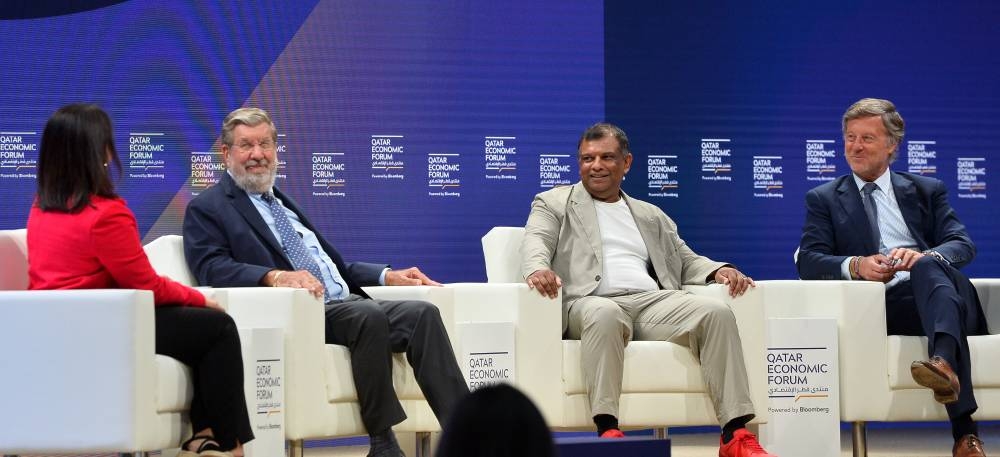Businesses that fail to overcome Artificial Intelligence (AI) and digitisation challenges risk being left behind in rapidly evolving industries, according to travel and tourism industry experts who addressed the second day of the Qatar Economic Forum 2023 yesterday.
“The booking system now depends so much on AI and chatbots ... If you haven’t been overcoming your digitisation problems quickly, you’re gonna be left way behind and we’re seeing that happen very rapidly,” Minor International founder and chairman William Ellwood Heinecke said.
Heinecke, along with Accor Group chairman and CEO Sebastien Bazin, Capital A CEO Tan Sri Tony Fernandes, was speaking at a discussion titled ‘Tourism Opening Up’. It was moderated by Bloomberg Live Experiences Deputy Global Editor Mallika Kapur.
Heinecke highlighted the increasing reliance on AI and chatbots, particularly in the booking systems of different business entities. About concerns on the limitations of AI such as the failure of chatbots fail to provide accurate answers and leave customers without any human assistance, he noted that different customer segments have varying preferences.
“Today... when we look at those under 35s and over 35s, you’re gonna find people who want luxury but still don’t want that personal contact, and then you’re gonna find other people that are, in the older category, that want that personal contact.
“You’re gonna find both, and smart operators and smart hotels are going to be able to find how they can use both, but digitisation in terms of how to make our people more effective is very critical,” he said.
Citing the difficulty of achieving multilingual support with human resources alone, Heinecke noted that AI significantly helps in addressing customer inquiries quickly and efficiently due to its language capabilities.
Fernandes echoed a similar view saying that AI-powered systems will eventually replace humans in certain customer service areas, especially with companies that handle huge volumes of clients.
“But right now you just have the mix of both. To handle and carry 90mn people, to have a call centre to deal with those is not feasible, generally waiting for ages online, so a lot of it can be done self-service.
“We’ve been through nightmares, like refunds, etc, so AI definitely will help, it’s gonna make the customer more in control and have quicker decisions so we’re big believers.
“So on the operation side in terms of scheduling, in terms of predictive maintenance, we’ll have a much more reliable airline through operational excellence by the use of AI. It just cannot be done by humans. So it’s an exciting period. I don’t see, every industrial revolution, people would predict the end of jobs, it always gets better so we are a big believer,” he said. Bazin, however, highlighted the human aspect of the hospitality industry and emphasised that AI should not be present during a guest’s stay, asserting that no one wants to be served or welcomed by a robot.
“Anything before, after the stay, AI is an enhancer and a remarkable tool. During your stay, 24 hours, 72 hours, I do not want to have any AI. None of you wants to be served by a robot, you don’t wanna be welcomed by a robot, or if you do, don’t come with me,” Bazin said.
Such industry, he noted, depends on human capital, and telling people that they will be replaced by robots would lead to increased unemployment. “Our hospitality industry is made of men and women and if you have to wait and don’t understand one another for 10 minutes, it is part of our job. You have unforeseen events, three, five times a day in a hotel and it is actually resolved by a man and a woman so I do not want any AI during your stay, period,” Bazin added.

(From left) Mallika Kapur with William Ellwood Heinecke, Tan Sri Tony Fernandes, and Sebastien Bazin at the Qatar Economic Forum, discussing the role of AI in the travel and tourism industries. PICTURE: Shaji Kayamkulam

